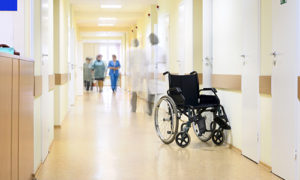 As COVID-19 spreads, concerns over a significant outbreak are growing. Residents of nursing homes and assisted living facilities are particularly vulnerable due to their age, pre-existing medical conditions, and frequent exposure to healthcare staff, other residents and visitors.
As COVID-19 spreads, concerns over a significant outbreak are growing. Residents of nursing homes and assisted living facilities are particularly vulnerable due to their age, pre-existing medical conditions, and frequent exposure to healthcare staff, other residents and visitors.
Did you know that poor infection prevention and control are one of the most frequently cited health violations in nursing homes? Did you know that despite the frequency of understaffing, abuse and neglect, nursing homes are rarely punished? Inadequate enforcement of federal nursing home standards is commonplace, leaving nursing home residents vulnerable to sickness and death.
It is ESSENTIAL that nursing homes and long term care facilities take concrete steps NOW to protect their residents AND staff. The CDC recommends common sense protocols like thorough handwashing, and regular disinfection of frequently touched surfaces.
What can YOU do to protect your loved ones and yourself?
Tips For Residents, Families, and the Public:
- Wash your hands. With soap. Lather your palms, the backs of your hands, between your fingers, and under the nails. Do this for at least twenty seconds. Proper handwashing is one of the most effective ways to protect yourself and your loved ones from germs.
- When you sneeze or have to cough, cover your nose and mouth with a tissue or your upper arm, not your hand.
- Avoid close contact with people who are sick.
- Get in the habit of not touching your eyes nose or mouth.
- Regularly disinfect surfaces on in bedrooms, equipment, and common areas.
Preparation is Key
What safety measures does your loved one’s facility have in place to prevent and control infection?
What is the facility’s plan for providing staffing, food, and medication in the event of an outbreak?
Not sure? ASK.
Every long-term care facility should be holding infection control boot camps for their employees and limiting face-to-face contact between residents, staff and visitors. Staffing policies must be overhauled to enable potentially ill employees to take time off while still maintaining appropriate caregiver-to-patient ratios.
Nursing Homes vs Assisted Living:
Did you know that Nursing Homes are regulated federally? They must meet federal requirements for safety and staffing. One of these is that nursing homes are required to have a registered nurse (RN) for at least one shift per day, including weekends. RNs have the professional training to clinically assess your loved one’s condition. Also, any other caregiver in a nursing home governed by federal regulations must be a certified nurse’s aid (CNA). This certification requires 75 hours of training and on-going in-service education.
In contrast, Assisted Living Facilities are regulated by state laws. State regulation is harder to enforce and is generally more relaxed. For example, most states do not require RNs or CNA’s on staff in assisted living facilities.
If your loved one is at an assisted living facility, be aware that they are just as vulnerable to infection as a nursing home resident, but are not protected by federal safety standards.
Has your facility been cited before? You can check their record here: https://nursinghome411.org/nursing-home-infection-control-citations-march2020/ and staffing levels here https://nursinghome411.org/nursing-home-staffing-2019-q3/.
Though the federal standards only apply to nursing homes, everyone – no matter where they live – has the right to live safely and to expect to be provided with appropriate infection control and prevention safeguards in their facility.
We Can Help
If a loved one has sustained a serious infectious disease complication resulting from neglect or missed medical treatments provided by a nursing home or due to a dangerously low level of care staff, they may be entitled to compensation.
Please call Bill Friedlander or Holly Mosher now for a free consultation at (607) 272-5590.








